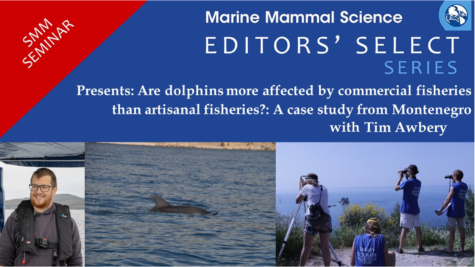
for the next SMM Seminar Editors’ Select Series:
Are dolphins more affected by commercial fisheries than artisanal fisheries?: A case study from Montenegro
with Tim Awbery
This event is free to attend and presented online via Zoom, but registration is required.
Register here: https://us06web.zoom.us/webinar/register/WN_wIJwObUlS4WwS7lv5g2utA
Space on Zoom is limited to the first 500 attendees. The talk will also be streamed live on the SMM Facebook page.
About this talk:
Since bottlenose dolphins often inhabit coastal waters and have a diet consisting mainly of fish, it is unsurprising that they often overlap with fisheries. While a number of previous studies have demonstrated that the presence of boats (particularly those associated with whale-watching) affect marine mammal behaviours, to our knowledge nobody has addressed whether different types of fishing vessels alter marine mammal behaviour. In this study, a combination of land-based and boat-based surveys were used to look at four different bottlenose dolphin behaviours, including diving, socialising, surface-feeding, and travelling. Dolphins were observed in both the presence of large commercial vessels and smaller artisanal fisheries, as well as in the absence of any marine vessel traffic. Both commercial fishing vessels and artisanal vessels were found to affect the behaviour of dolphins, but in different ways. Commercial fishing boats significantly altered the proportion of time that bottlenose dolphins spent performing three out of four of the recorded behaviours. While artisanal fishing boats only affected the proportion of time spent performing one behaviour, this behaviour was surface-feeding, important to dolphins for obvious reasons. If dolphin behaviours are interrupted for a long period, it is likely to have consequences on the health of the dolphin population. This work, alongside previous studies, demonstrates that vessel type is an important factor in how a dolphin might be disturbed and therefore must be taken into account when considering management strategies.
About the presenter:
Tim Awbery is a researcher in the Marine Mammal Research Team at the Scottish Association for Marine Science, currently investigating minke whales on the west coast of Scotland. Previously, Tim worked in the Mediterranean for DMAD – Marine Mammals Research Association, a non-government organization based in Turkey. While his work took him throughout the north-east Mediterranean, he was predominantly based in Montenegro, Turkey, and Albania, working on several marine mammal research projects. Tim has been involved in the publication of a range of studies providing some of the first data from overlooked regions in these countries. His research has two primary focuses: building a baseline of marine mammal data in understudied areas and using these data to understand where marine mammals and human threats overlap and how these threats affect marine mammals. He intends his work to inform conservation by providing concrete information, rather than leaving managers to rely on anecdotal evidence when making decisions.
Open access to all Marine Mammal Science papers is available to current SMM members. Open access to this article is made temporarily available to the public in the weeks around the presentation and can be found here.
Missed a presentation or want to share this series with a friend? All previous Editors’ Select presentations are recorded and archived on our YouTube channel here: https://www.youtube.com/playlist?list=PLUc78IynQlubS2DVS1VZoplf_t42-yZOO